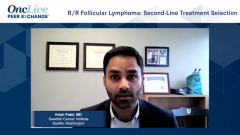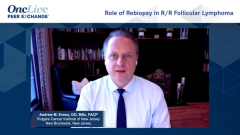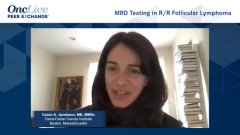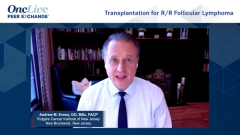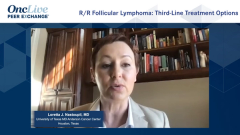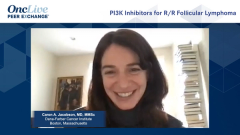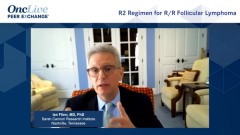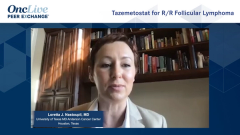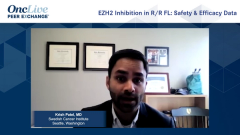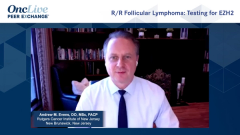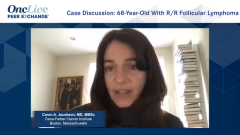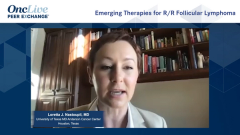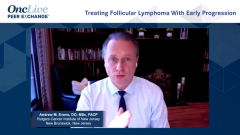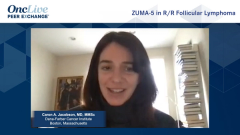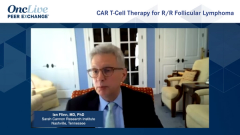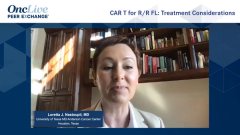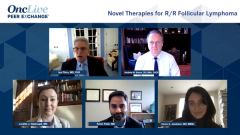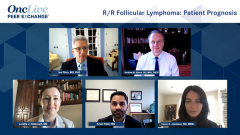
Tazemetostat for R/R Follicular Lymphoma
Drs Andrew M. Evens and Loretta J. Nastoupil remark on the recent approval of tazemetostat, an EZH2 inhibitor, as treatment for relapsed/refractory follicular lymphoma and highlight which types of patients are most appropriate to manage with this drug.
Episodes in this series

Ian Flinn, MD, PhD: We’ll switch and talk a bit about a new drug that’s recently been approved for patients with relapsed/refractory follicular lymphoma: tazemetostat. Loretta, it’s an interesting drug, right? Now we’re targeting EZH2. Before this drug was approved, EZH2 was not a well-known target for therapy. Or at least I didn’t pay a lot of attention to it, in terms of the biology. Can you walk us through the mechanism of action of tazemetostat?
Loretta J. Nastoupil, MD: Tazemetostat is an EZH2 inhibitor. It’s an oral therapy. We know that epigenetic alteration has been important, in terms of the pathogenesis in follicular lymphoma, but it’s been hard to really pinpoint the most important alteration and most important therapy to target that. But here comes tazemetostat. It targets EZH2. We know that about 20% of patients with follicular lymphoma will have an EZH2 mutation. Not surprisingly, when you look at the data, there’s a higher response rate among those patients who have an EZH2 mutation. That may speak to the fact that the gain of function mutations might be leading to excessive proliferation in the B-cell maturation process. But there’s also likely a component of the microenvironment.
We also saw durable responses among patients who didn’t have the mutation—who were EZH2 wild type. We don’t fully understand whether there may be a role for EZH2 in the immune escape, in the pro-tumor microenvironment that’s so prevalent in follicular lymphoma. By targeting EZH2, you might be able to mitigate those survival strategies as well.
Ian Flinn, MD, PhD: Perfect. Andy, who is the best patient to treat with tazemetostat? Maybe you can walk us through where it’s FDA approved. Is that where you’re using it? Who’s the ideal patient for this drug?
Andrew M. Evens, DO, MSc, FACP: There are a couple of key points to highlight in regard to the use of tazemetostat. Its approval is a little wordy or descriptive. But I think how the FDA did try to navigate is based on whether it is EZH2 mutated or not.
The official approval is for relapsed/refractory follicular lymphoma, and they say it is for patients who are positive for an EZH2 mutation, as by an FDA-approved test, who have received at least 2 prior therapies. In the phase 2 study that garnered approval, the overall response rate was around 70%, with around 12% CRs [complete responses] and a median duration of response of about a year. That wording is really meant for that subgroup [the EZH2-mutant follicular lymphoma group], which by the way, represents only about 25% of all follicular lymphoma cases.
Going back to the FDA label, it says that “for adult patients with relapsed/refractory follicular lymphoma who have no satisfactory alternative treatment options.” That’s pretty generic wording, but it’s consistent with how the FDA is using it. There was identical wording for pembrolizumab in the treatment of patients with unresectable metastatic tumor mutational burden–high disease. That had a response rate, in that situation, of around 30%. So patients who are EZH2 wild type have a response rate of around 30%. That’s what that’s really targeting—that phraseology, you could say. Interestingly, even though it’s half as robust of a response rate for the patients with wild-type EZH2, the duration of response is about the same as if you had the mutation—around a year.
Transcript Edited for Clarity


